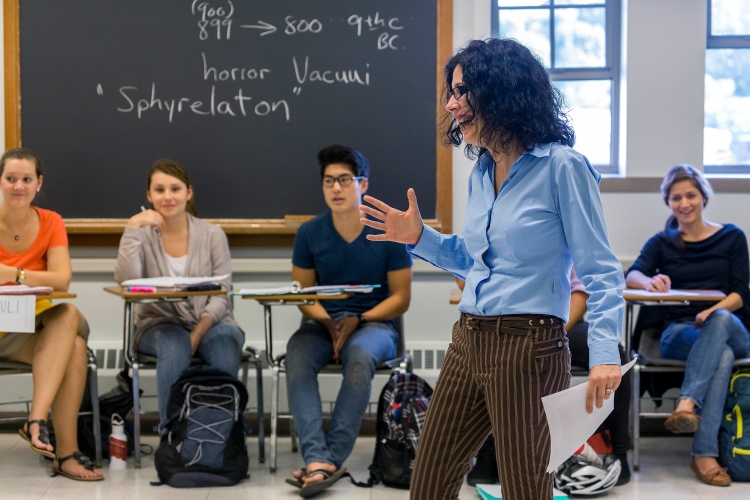
By
Before she came to Boston College last fall, School of Theology and Ministry student Erin Ramsey spent more than two years working at a residential children's home in Honduras. But while the experience was invaluable, Ramsey felt she needed to build on it as she pursued her goal of becoming a social worker.
Then she heard about the Graduate School of Social Work’s newly launched Latino Leadership Initiative, which includes a set of foundation and method courses, such as Diversity and Cross-Cultural Issues, that are available in Spanish as well as in English. It was, thought Ramsey — a joint degree candidate in ministry and social work — just what she was looking for.
“I believed that the program would enable me to maintain the language skills I had developed during my time in Central America,” she said. “Additionally, though, I hoped that the Latino Leadership Initiative would help me to understand better the lived reality of Hispanics and Latinos in the United States, and would help me grow into a better social worker.”
“I want to branch out, not be culturally homogenized,” said another participant, GSSW student Claire Madden. “What’s great about the Latino Leadership Initiative is that we’re not just learning about diversity — we’re practicing it.”
GSSW administrators and faculty say the groundbreaking Latino Initiative bolsters students' linguistic and cultural competencies to work with Latino communities in the US and abroad. The initiative reflects the school’s commitment to a global view of practice and policy in social work and preparing students to serve an increasingly diverse clientele: As administrators and faculty note, projections indicate that in a few decades so-called “minorities” will comprise the majority of the US population — and Latinos are expected to be the predominant group.
"Universities have an opportunity and a responsibility to respond to the dramatic demographic change of the US population,” said GSSW Dean Alberto Godenzi. “The GSSW's Latino Leadership Initiative is an innovative approach to ensure that our students are in a position to embrace this historic transformation. BC's heritage and mission inspired us to launch an initiative that builds on our relationships with Latino stakeholders and honors the University's commitment to a faith that does justice."
But the ability to speak Spanish is only a part — albeit an important one — of the skill set the Latino Leadership Initiative promotes, according to Assistant Professor Rocio Calvo, who is overseeing the initiative, in which some 30 students are taking part.
“First, we have to understand that ‘Latino’ is very diverse — economically, socially and racially — and within this complex diversity are certain cultural traits,” she said. “Culture does not define, but it may influence. So, it’s important to see how these traits can influence interaction with social service providers. Along with that, it’s necessary to explore the political, social and economic aspects of Latinos in the US, and to understand the impact of culturalization and assimilation.
“What we are doing is providing students with a tool belt. They may not use all the tools all the time, but having them at hand — and the discernment to know which ones to use and when — will help them to become better social workers.”
For example, says Calvo, research shows that Latinos tend to be particularly deferential to those in a position of authority, including social service professionals. “Perhaps the Latino client may not ask questions or challenge the provider, and so he or she may leave an appointment without a clear understanding of what’s going on.”
Another key aspect of working in a Latino community, she added, is understanding the importance of “personalismo”: “Because time is so often at a premium in health care and social service, providers don’t always make the effort to cultivate a more personal rapport with the persons they serve. That should be a concern no matter who the client is, but what needs to be understood is how very meaningful ‘personalismo’ is among Latinos.”
Ramsey praises the Latino Leadership Initiative for broadening her professional, as well as personal, perspective and strengthening her passion for working in Latino communities. The “tool belt” to which Calvo refers served Ramsey well in her placement last year at Cristo Rey High School in Dorchester.
“I had the opportunity to work with several Latino and Latina students in the context of my role as a counseling intern,” she said. “While my time in Honduras helped give some context to these students' experiences, I knew that my experience there might not be germane to what life in the US is like for them - which is where the Latino Leadership Initiative came in. My class with Rocio helped ‘give language’ to my experiences working with these students, and provided me with specific strategies that would enable me to work more competently and sensitively with them.
“I feel confident that the program will not only help me to be a better social worker, but will also increase my marketability as I look for jobs after graduation. Being able to speak Spanish is an incredible asset in our field, and the additional set of skills that the Latino Leadership Initiative aims to provide seems to really be something that social service agencies are looking for as they go about hiring new clinicians.”
Calvo said the initiative also has a research component and, she added, could serve as a catalyst for interdisciplinary collaborations across Boston College.
“It would be wonderful to work with other schools and departments, because there are issues that would be of interest to many faculty and students,” she said. “The core of this initiative speaks to what BC is all about: educating men and women for others.”



